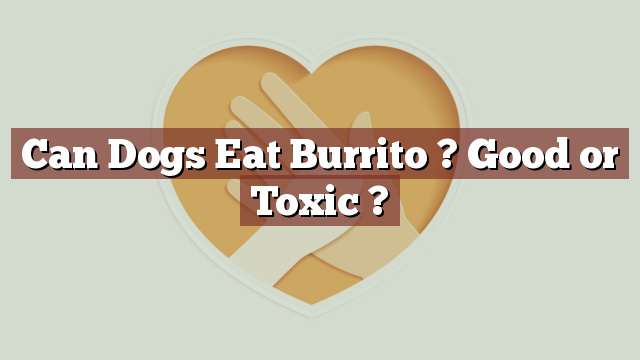Can Dogs Eat Burrito? Good or Toxic?
It is crucial for pet owners to be aware of which foods are safe for their furry companions. Dogs have different dietary needs than humans, and some human foods can be toxic or harmful to them. In this article, we will explore whether dogs can safely consume burritos and the potential risks or benefits associated with it.
Nutritional Value of Burrito for Dogs: What Does it Contain?
A burrito is a popular Mexican dish that typically consists of a tortilla filled with various ingredients such as beans, rice, meat, cheese, and vegetables. While burritos can be a delicious and satisfying meal for us, it is important to consider whether they provide any nutritional value for dogs.
The nutritional content of a burrito varies depending on its ingredients. While some components like rice and vegetables may offer certain health benefits, others like cheese, meat, and sauces may not be suitable for our canine companions. It is crucial to remember that dogs require a balanced diet that meets their specific nutritional needs.
Can Dogs Eat Burrito? Exploring the Safety and Toxicity Factors
Can dogs eat burrito? The answer is no, dogs should not eat burritos. Although some ingredients in a burrito may be safe for dogs to consume, the overall composition of this dish is not suitable for their digestive systems.
Burritos often contain seasonings, spices, and sauces that can be harmful to dogs. Ingredients like onions and garlic, commonly found in burritos, can be toxic to dogs and cause issues such as anemia. Additionally, the high sodium content in processed meats and cheese can lead to sodium poisoning in dogs, which can be life-threatening.
Potential Risks or Benefits of Allowing Dogs to Consume Burrito
Allowing dogs to consume burrito can pose several risks to their health. As previously mentioned, the inclusion of toxic ingredients like onions and garlic can lead to severe health problems. Furthermore, the high fat content in some burrito fillings can cause gastrointestinal upset, leading to vomiting, diarrhea, or pancreatitis in dogs.
On the other hand, some ingredients in a burrito, such as black beans and certain vegetables, may provide limited health benefits to dogs. However, these benefits can easily be obtained from other dog-friendly foods that do not carry the same risks as a burrito.
My Dog Ate a Burrito – What Should I Do Now?
In the unfortunate event that your dog has consumed a burrito, it is important to take immediate action. If your dog ingests a burrito, especially if it contained toxic ingredients like onions or garlic, contact your veterinarian right away. They will be able to provide guidance based on your dog’s specific situation and may recommend inducing vomiting or other necessary treatments.
Conclusion: Weighing the Pros and Cons of Dogs Eating Burrito
In conclusion, dogs should not eat burritos. While some ingredients in a burrito may be safe for dogs, the potential risks associated with the toxic ingredients and high fat content outweigh any potential benefits. It is always best to stick to a balanced and specially formulated diet for your canine companion to ensure their overall health and well-being. If you have any concerns or questions regarding your dog’s diet, consult with your veterinarian for professional advice.
Thank you for investing your time in exploring [page_title] on Can-Eat.org. Our goal is to provide readers like you with thorough and reliable information about various dietary topics. Each article, including [page_title], stems from diligent research and a passion for understanding the nuances of our food choices. We believe that knowledge is a vital step towards making informed and healthy decisions. However, while "[page_title]" sheds light on its specific topic, it's crucial to remember that everyone's body reacts differently to foods and dietary changes. What might be beneficial for one person could have different effects on another. Before you consider integrating suggestions or insights from "[page_title]" into your diet, it's always wise to consult with a nutritionist or healthcare professional. Their specialized knowledge ensures that you're making choices best suited to your individual health needs. As you navigate [page_title], be mindful of potential allergies, intolerances, or unique dietary requirements you may have. No singular article can capture the vast diversity of human health, and individualized guidance is invaluable. The content provided in [page_title] serves as a general guide. It is not, by any means, a substitute for personalized medical or nutritional advice. Your health should always be the top priority, and professional guidance is the best path forward. In your journey towards a balanced and nutritious lifestyle, we hope that [page_title] serves as a helpful stepping stone. Remember, informed decisions lead to healthier outcomes. Thank you for trusting Can-Eat.org. Continue exploring, learning, and prioritizing your health. Cheers to a well-informed and healthier future!

